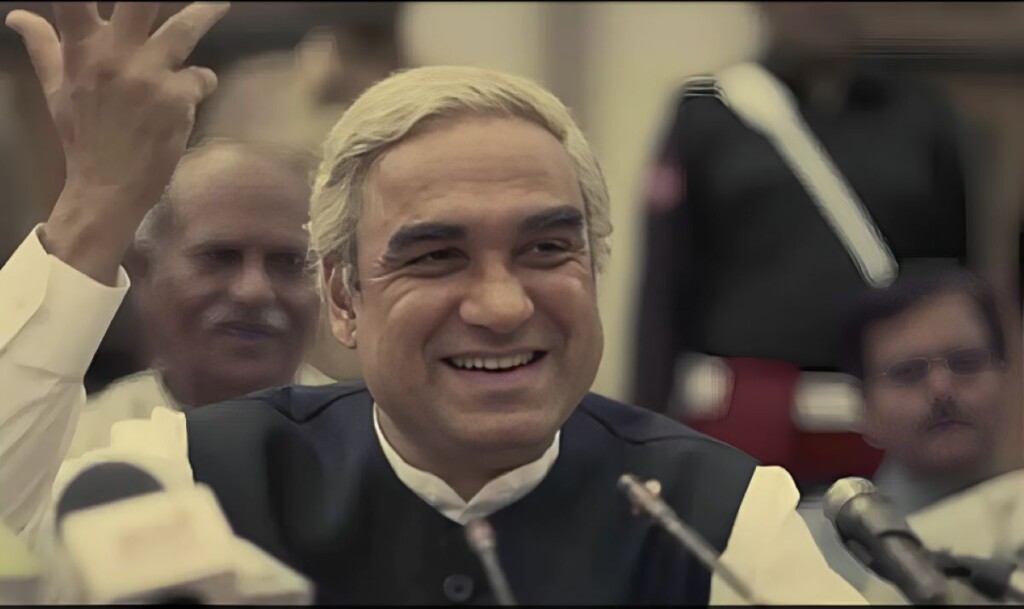The biopics produced by the Mumbai movie industry often fail to do justice to either contemporary or historical figures of significance. Unfortunately, Main Atal Hoon, directed and co-written by the acclaimed filmmaker Ravi Jadhav, does little to change this perception.
If it were not for its lack of redeeming qualities, Main Atal Hoon could be considered a botched attempt. The film’s rushed production is evident in its flaws, which could have been avoided with more time and attention. Jadhav, known for his meticulousness, seems to have overlooked this aspect in Main Atal Hoon.
Rather than being a true homage, Main Atal Hoon leans more towards hagiography. It takes a comprehensive approach, covering Atal Bihari Vajpayee’s life from birth to death. However, it fails to fully explore the various aspects of the right-wing leader’s childhood and political career.
The film presents fragments of Vajpayee’s life, focusing on the highlights in an attempt to create a sense of awe and reverence. Unfortunately, this strategy falls short in terms of both drama and cinematic impact. The conflicts within the story are downplayed to highlight Vajpayee’s unwavering determination, as symbolized by his given name, ‘Atal’.
Main Atal Hoon brings to the fore aspects of Vajpayee’s life and times that serve the demands of the prevalent political climate but it is unable to put together a truly dramatic portrait of a statesman and an orator who encountered many ups and downs and ebbs and tides in the course of a long journey through the tumult of the freedom struggle, the vicissitudes of nation-building and the challenges of party work.
Main Atal Hoon is a single-note biography salvaged a touch – only a touch – by Pankaj Tripathi’s central performance. The actor spares no effort to get into the skin of Vajpayee and imitating his body language and speaking style.
Tripathi’s efforts do not bear the expected fruit because the screenplay on which the performance stands is hobbled by a lack of imagination and true insight. The blend of humanity and political expediency, political acumen and communication skills would have yielded much greater dividends had Jadhav and co-writer Rishi Virmani focused more on the questions that Vajpayee faced than on the answers that he found and delivered.
Main Atal Hoon meanders from one thing to another, intent solely on talking up the deeds that the real-life protagonist performed as a politician and Prime Minister. The complexities of subcontinental politics and the intricacies of ideological warfare in Parliament and outside of it are well beyond this film’s limited purview.
The film’s approach relies on oversimplified and simplistic methods that strip away any complexity. Vajpayee’s efforts to promote friendship between India and Pakistan, including his symbolic journey on the Delhi-Lahore bus, are mentioned in the narrative. However, his peacemaker persona is only given a small mention in a film that is clearly designed to promote a specific set of beliefs.
The reference to the Kargil victory, now celebrated as Kargil Vijay Diwas, could have been more meaningful in this film if it had also acknowledged the intelligence failure that led to the border conflict and the human toll it took.
Although Pankaj Tripathi’s casting as the politician may not be physically accurate, he manages to overcome questions of authenticity with a performance that comes close to perfection within the constraints of the role as written by the writers.
Based on the Marathi book “Atalji: Kavihridayache Rashtranetyachi Charitkahani” (The Story of a Poet-Leader) by Sarang Darshane, “Main Atal Hoon” portrays Vajpayee as both a poet and a politician with exceptional public speaking skills. The lead actor effectively brings out the latter aspect of Vajpayee’s personality.
Would Main Atal Hoon have been a significantly different film if the filmmakers had not strictly adhered to the book’s title and instead explored the idea of a politician with a poet’s temperament, someone who had a deep love for the Hindi language and had mastered it, which is a rarity in politics? Undoubtedly, this would have resulted in a more fulfilling film. However, it would not have fulfilled the intended purpose of the project.
The film primarily focuses on Vajpayee’s personal relationships and political affiliations, overlooking many important details and nuances that could have contributed to a more comprehensive, analytical, and impartial portrayal, rather than the unabashed tribute it has become.
There are certain aspects in the film that had immense potential – Vajpayee’s relationship with his father (portrayed by Piyush Mishra) and his enduring friendship with Rajkumari Kaul (Ekta Kaul) are prime examples. However, the script treats them, along with everything else, as mere puzzle pieces to be fitted into the larger picture.
From a purely cinematic standpoint, it is difficult to be enthusiastic about what Main Atal Hoon has to offer. However, considering the film’s clear purpose, it may not be a complete failure. It might find an audience beyond those who seek greater critical depth and range in Bollywood biopics, only to be consistently disappointed.
Cast:
Pankaj Tripathi, Piyush Mishra, Ekta Kaul
Director:
Ravi Jadhav
